39 nutrition labels list the energy content of food in
Nutrition labelling | Food Standards Agency energy value must be expressed in kilo joules (kJ) and kilo calories (kcal) and the amount of the nutrients must be expressed in grams (g) all elements must be included next to each other. The... Understanding food labels: portions, energy | Health24 However, many manufacturers still list the energy content of foods in calories (cal) or use both kJ and calories. Confusion arises when the label expresses the energy content in kcal (or kilo-calories). Energy contained in food is always expressed in kcal, but most manufacturers forget to use the 'k' in front of the 'cal' in the abbreviation.
Energy in Food and Nutrition | Chemistry for Non-Majors - Course Hero The energy in the food that we it is measured in units of kilocalories or Calories. The Calorie (Cal, with an uppercase C) used to measure the nutrition in food is actually 1000 calories (cal) (with a lowercase c) or 1 kilocalorie (kcal). While the Calorie unit is used widely in the U.S., the kilojoule (kJ) is in widespread use internationally.

Nutrition labels list the energy content of food in
Nutrition Labelling - CFS Nutrition label must include the information on energy and seven nutrients specified for labelling (1+7), namely, protein, carbohydrates, total fat, saturated fatty acids, trans fatty acids, sodium and sugars. Furthermore, the nutrition label must list the amounts of any claimed nutrients. How to Understand and Use the Nutrition Facts Label | FDA Feb 25, 2022 · Overview. The information in the main or top section (see #1-4) of the sample nutrition label (below) can vary with each food and beverage product; it contains product-specific information ... Food energy - Wikipedia Many governments require food manufacturers to label the energy content of their products, to help consumers control their energy intake. To facilitate evaluation by consumers, food energy values (and other nutritional properties) in package labels or tables are often quoted for convenient amounts of the food, rather than per gram or kilogram; such as in "calories per serving" or "kcal per 100 ...
Nutrition labels list the energy content of food in. Calories on the New Nutrition Facts Label | FDA - U.S. Food and Drug ... One package of food may contain more than one serving, so, if you eat two servings you would be getting two times the calories shown on the label. For example, if you ate one serving of the food... Food Labels | CDC - Centers for Disease Control and Prevention If you eat the whole thing, you are eating 8 times the amount of calories, carbs, fat, etc., shown on the label. Total Carbohydrate shows you types of carbs in the food, including sugar and fiber. Choose foods with more fiber, vitamins, and minerals. Choose foods with lower calories, saturated fat, sodium, and added sugars. Avoid trans fat. Nutrition facts label - Wikipedia In 2011 the Chinese Ministry of Health released the National Food Safety Standard for Nutrition Labeling of Prepackaged Foods (GB 28050-2011). The core nutrients that must be on a label are: protein, fat, carbohydrate and sodium. Energy is noted in kJ. And all values must be per 100g/100ml. [11] [12] An example of a Chinese nutrition facts label What are Nutrient Content Claims on food labels? - Nutritionist Pro™ Nutrient Content Claims on Food Panels List energy, fat, carbohydrates, protein, and sodium. The nutritional information panels are a better guide than advertising. If the product contains food-inducing allergens, the label must say so. Some of the healthiest foods don't have labels, including fresh fruit and vegetables, and fish.
Food Labels | Nutrition.gov What's New with the Nutrition Facts Label. HHS, Food and Drug Administration. The U.S. Food and Drug Administration (FDA) has updated the Nutrition Facts label on packaged foods and beverages with a fresh design that will make it easier for you to make informed food choices that contribute to lifelong healthy eating habits. What's in a Name? Learn How the Nutrition Facts Label Can Help You Improve Your Health The Nutrition Facts label on packaged foods is based on updated science and dietary recommendations for Americans. Using the label can help you choose foods for a healthy diet. The label is required on all packaged foods made in the United States and imported from other countries. The US Food and Drug Administration (FDA) issued regulations in ... SELF Nutrition Data | Food Facts, Information & Calorie ... The Caloric Ratio Pyramid™ The Caloric Ratio Pyramid appears in every ND analysis, and also on ND's Total Consumption report. This symbol lets you see at a glance how the Calories in the food are distributed, and can help you determine if the food aligns with common macronutrient-based diet plans, such as low-carb (e.g Atkins™ or South Beach™), low-fat, high-protein, or Zone™. The 11 Best Vitamins and Supplements to Boost Energy - Healthline May 28, 2018 · Experts say nutrition labels on the front of food packaging will help consumers make healthier choices as long as they're not confusing READ MORE The 10 Best Meal Delivery Services for Seniors in 2022
Fats | Nutrition.gov HHS, Food and Drug Administration, Center for Food Safety and Applied Nutrition Read about monounsaturated and polyunsaturated fats - what they are, where they are found, what they do, and how to use the Nutrition Facts Label to replace saturated fat with mono and polyunsaturated fats. How to calculate the Energy available from foods - Time-to-Run To calculate the energy available from a food, multiply the number of grams of carbohydrate, protein, and fat by 4,4, and 9, respectively. Then add the results together. For example, 1 slice of bread with a tablespoon of peanut butter on it contains 16 grams carbohydrate, 7 grams protein, and 9 grams fat : 16g carbohydrate x 4 kcal/g = 64 kca l. Food labels & nutritional information | Raising Children Network All foods have to list seven food components on their nutritional information panels - energy (kilojoules), protein, total fat, saturated fat, total carbohydrates, sugars and sodium. Manufacturers might decide to include other nutrients too, including fibre and calcium. Nutritional Values For Common Foods And Products Highest caloric density foods Top Foods by Vitamin Vitamin A Thiamin Riboflavin Niacin Pantothenic acid Vitamin B6 Vitamin B12 Folate Vitamin C Vitamin D Vitamin E Vitamin K1 Betaine Choline Top Foods by Mineral Calcium, Ca Copper, Cu Fluoride, F Iron, Fe Magnesium, Mg Manganese, Mn Phosphorus, P Potassium, K Selenium, Se Sodium, Na Zinc, Zn
Food labelling and packaging: Ingredients list - GOV.UK If your food or drink product has 2 or more ingredients (including any additives), you must list them all. Ingredients must be listed in order of weight, with the main ingredient first.
New Nutrient Content Information Now Online | USDA For people who would like to consume a food source rather than a dietary supplement to increase their intake of, for example, Lutein and Zeaxanthin, an eight-page list of food sources is available in the Phytonutrient group. For a simple list of high calorie vs. low calorie foods, a Total Kilocalories list is available in the Macronutrient group.
Understanding Food Labels | The Nutrition Source | Harvard T ... Chile implemented the Law of Food Labeling and Advertising in 2016, comprised of mandatory front-of-package (FOP) warning labels, restrictions on child-directed marketing, and the banning of sales in schools of all foods and beverages containing added sugars, sodium, or saturated fats that exceeded set nutrient or calorie thresholds. [1]
Food labels: a guide to reading nutrition labels - MyDr.com.au A food making a 'diet' claim must meet some criteria regarding the content of nutrients of public health significance (saturated fat, sugars and sodium) and must either have no more than 80 kJ/100 mL (for liquid foods) or 160 kJ/100 g (for solid foods) or must have at least 40% fewer kilojoules than the same quantity of a reference food.
Food Labeling & Nutrition | FDA Food labeling is required for most prepared foods, such as breads, cereals, canned and frozen foods, snacks, desserts, drinks, etc. Nutrition labeling for raw produce (fruits and vegetables) and...
Food energy - Wikipedia Many governments require food manufacturers to label the energy content of their products, to help consumers control their energy intake. To facilitate evaluation by consumers, food energy values (and other nutritional properties) in package labels or tables are often quoted for convenient amounts of the food, rather than per gram or kilogram; such as in "calories per serving" or "kcal per 100 ...
How to Understand and Use the Nutrition Facts Label | FDA Feb 25, 2022 · Overview. The information in the main or top section (see #1-4) of the sample nutrition label (below) can vary with each food and beverage product; it contains product-specific information ...
Nutrition Labelling - CFS Nutrition label must include the information on energy and seven nutrients specified for labelling (1+7), namely, protein, carbohydrates, total fat, saturated fatty acids, trans fatty acids, sodium and sugars. Furthermore, the nutrition label must list the amounts of any claimed nutrients.
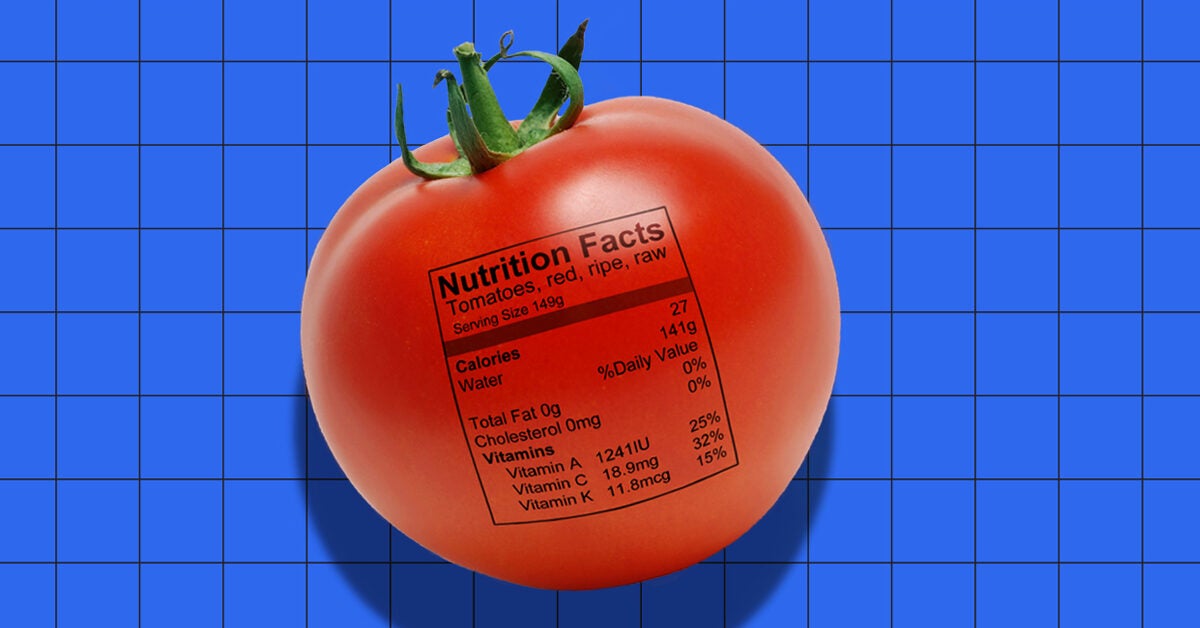



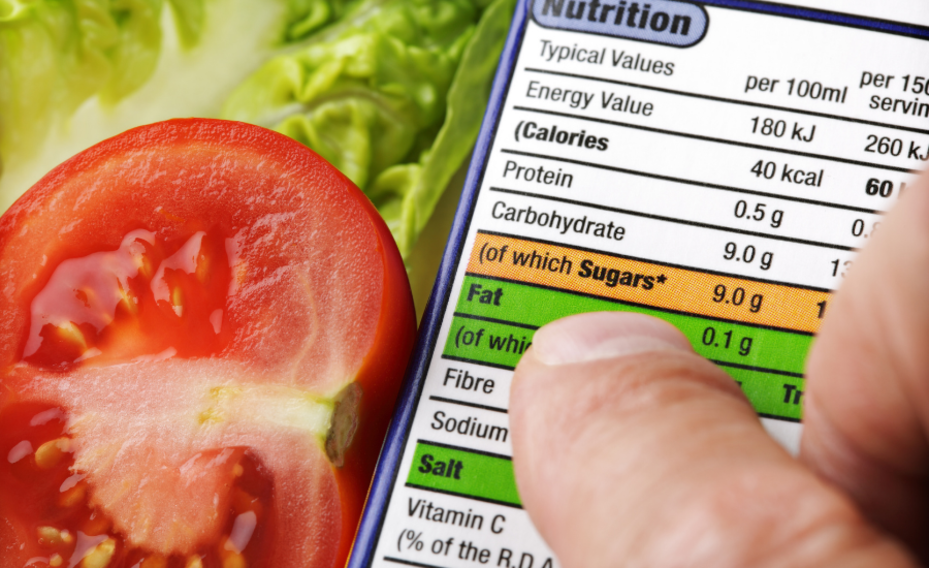

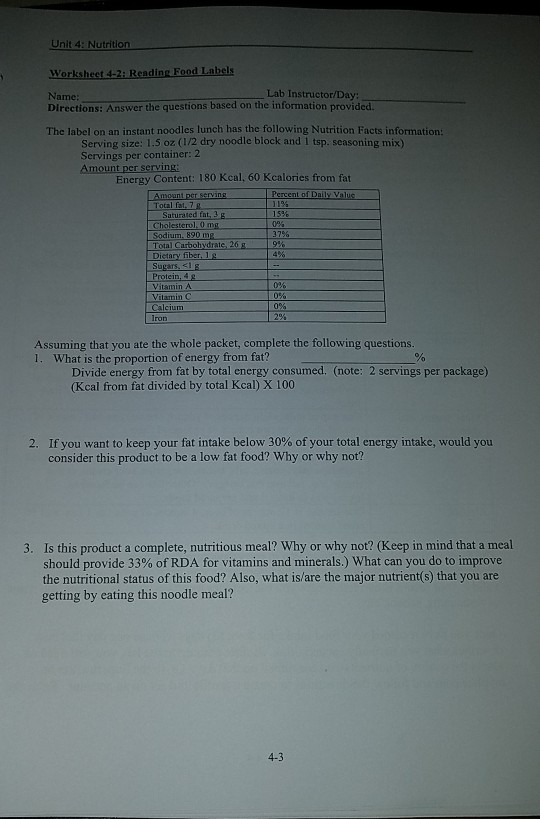

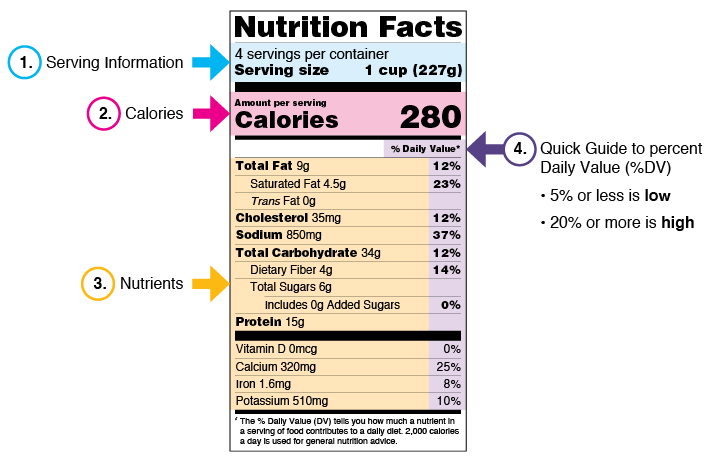
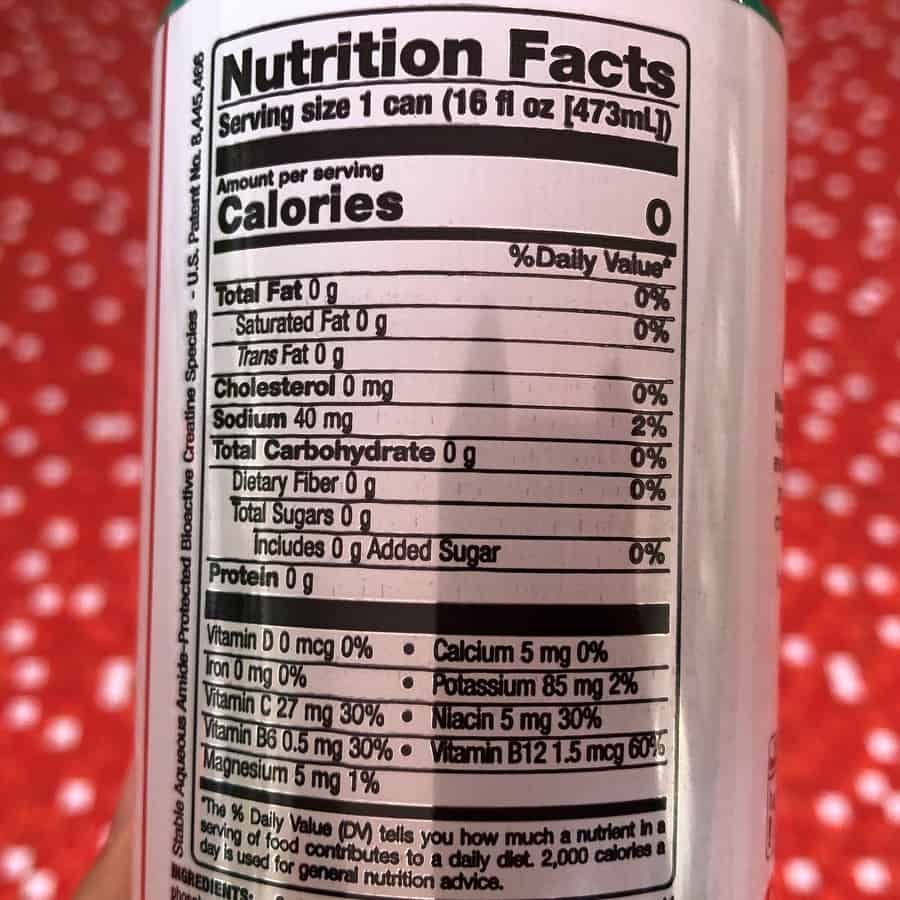


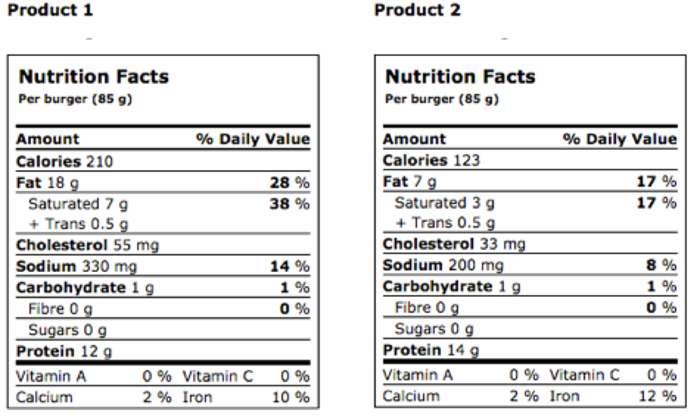
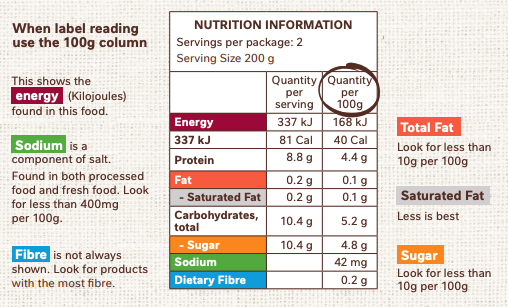


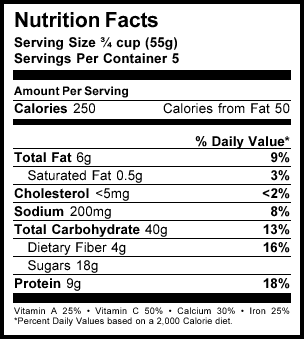
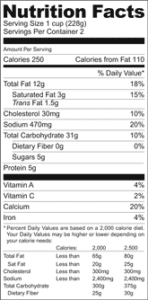



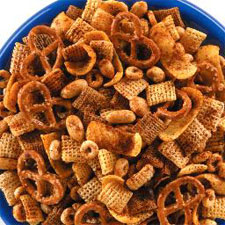





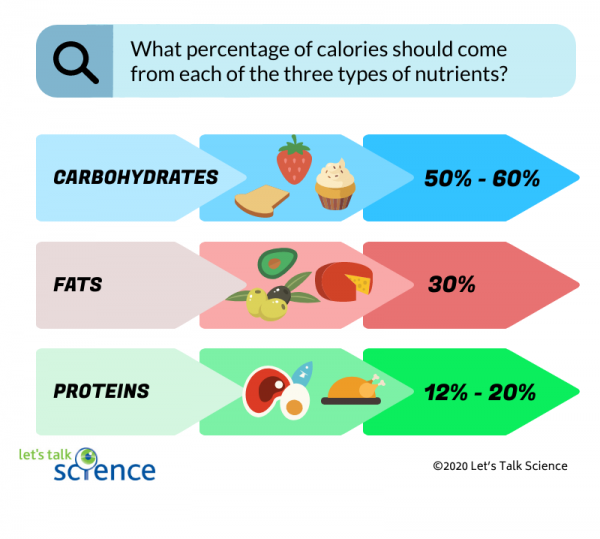

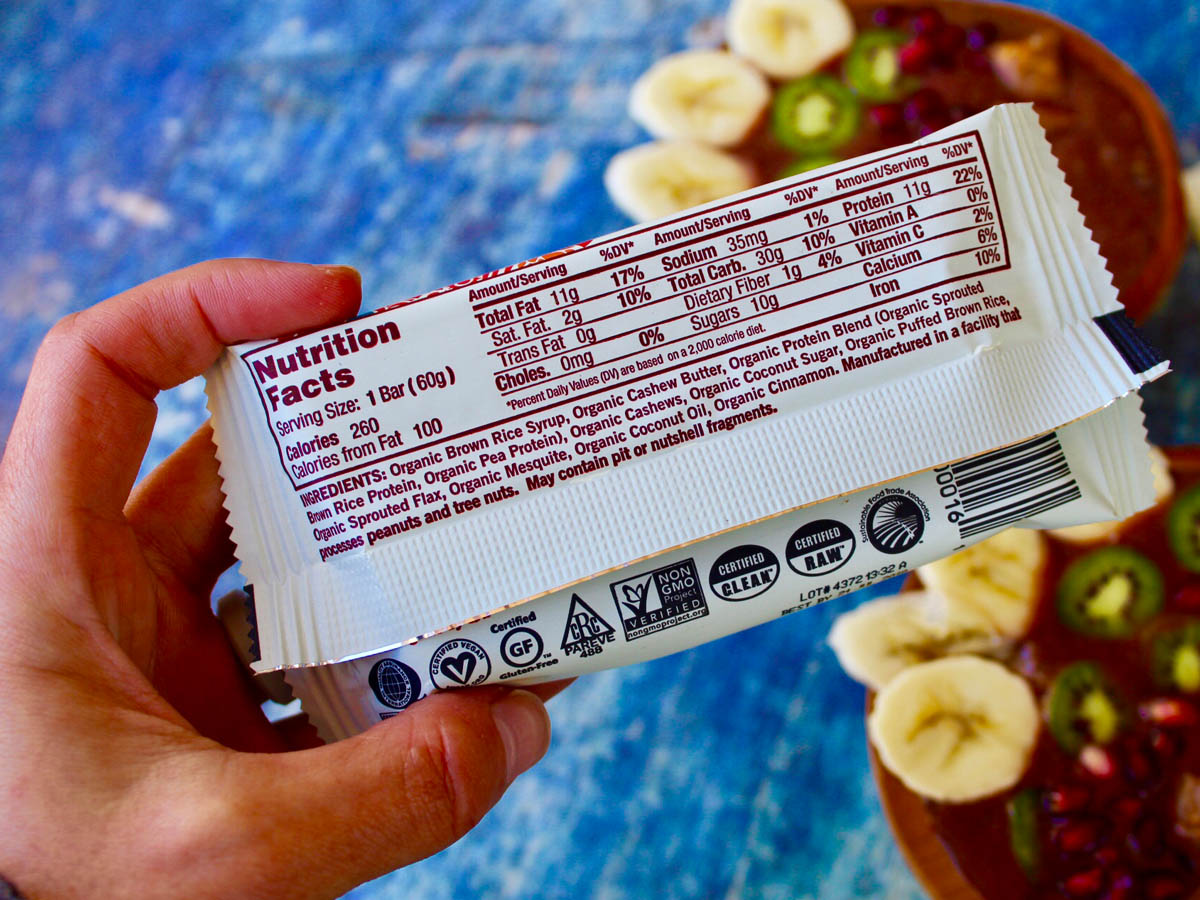
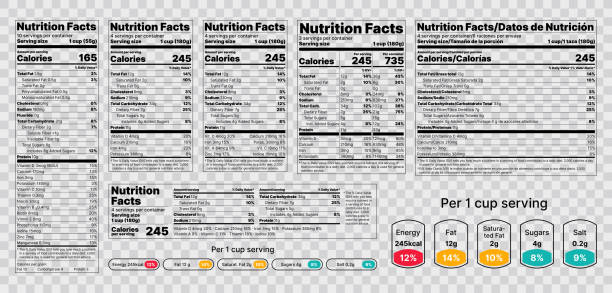


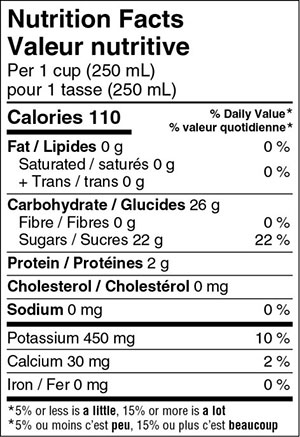
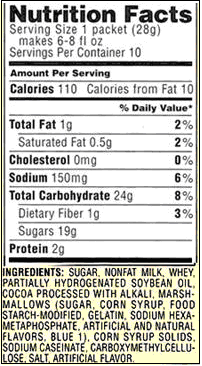
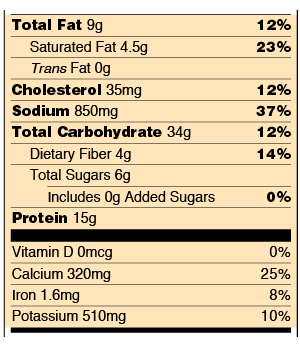
Post a Comment for "39 nutrition labels list the energy content of food in"